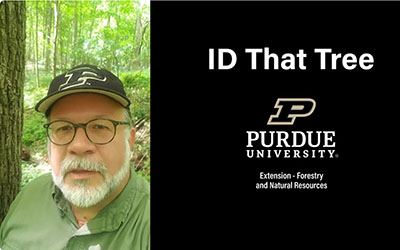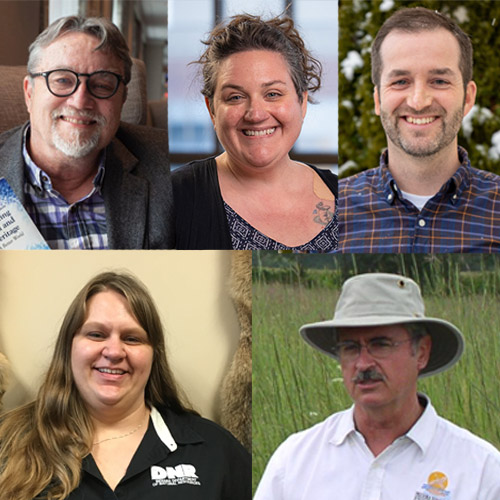Researchers Need Community Participation in Maple Syrup Producers Survey
Maple syrup is a $1.58 billion industry globally and is expected to expand 6.2% annually through 2028 according to Grand View Research.
Dr. Mo Zhou and graduate students Jean Fritz Saint Preux and Bindu Paudel are working with both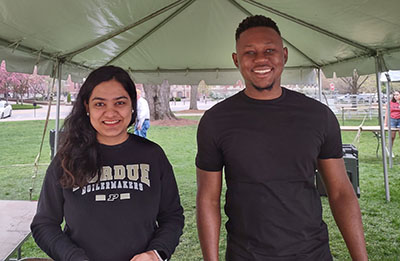 maple syrup producers and consumers to craft a marketing strategy aimed at increasing consumption and production in the state of Indiana.
maple syrup producers and consumers to craft a marketing strategy aimed at increasing consumption and production in the state of Indiana.
The research, which is funded by a $500,000 grant from the Acer Access and Development Program, addresses knowledge gaps related to supply and demand of maple syrup, consumer preferences for sustainable maple syrup, and maple syrup production practices in Indiana. The end goal is to raise awareness and create a connection between consumers and producers in the state, which was once the nation’s top maple syrup producers (in 1919).
Through two surveys, researchers have assessed both the producer and consumer aspects of the maple syrup industry. The producer survey was conducted to gain a deeper understanding of the mechanisms driving maple syrup production in Indiana, and its results shed light on the production, marketing, and management practices of maple syrup producers in Indiana, enabling a better understanding of the industry's dynamics and opportunities for improvement. The consumer survey focused on studying consumer demographic profiles as well as their preferences and choices related to maple syrup and its derivative products, which will help tailor marketing efforts to effectively reach the target audience and align with consumer preferences. Another key component of the research is to examine producers' decision-making processes in relation to sustainable sugarbush management and energy efficiency.
“The research outcomes will provide valuable insights for producers, enabling them to identify the strengths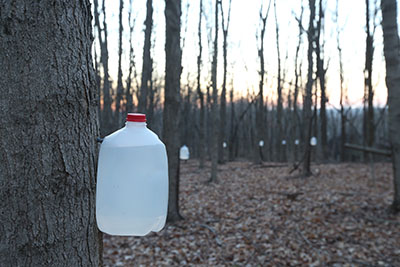 and weaknesses of the maple syrup industry, as well as uncover untapped potential opportunities,” Saint Preux explained. “Through our interactions with some consumers, we have observed a significant interest and eagerness to learn more about maple syrup, indicating a favorable market for producers. These findings will empower producers to adopt new marketing strategies and implement energy-efficient practices in their production processes. Moreover, by targeting and attracting new maple syrup consumers, the industry is likely to experience a positive financial impact. The aspect of sustainable sugarbush management and energy efficiency, in particular, will involve financial decisions for producers as they navigate and invest in sustainable practices for long-term growth and profitability.”
and weaknesses of the maple syrup industry, as well as uncover untapped potential opportunities,” Saint Preux explained. “Through our interactions with some consumers, we have observed a significant interest and eagerness to learn more about maple syrup, indicating a favorable market for producers. These findings will empower producers to adopt new marketing strategies and implement energy-efficient practices in their production processes. Moreover, by targeting and attracting new maple syrup consumers, the industry is likely to experience a positive financial impact. The aspect of sustainable sugarbush management and energy efficiency, in particular, will involve financial decisions for producers as they navigate and invest in sustainable practices for long-term growth and profitability.”
A third survey, which is aimed at gathering insights from Indiana maple syrup producers regarding their production practices and challenges, is no longer available. The deadline for participation was September 30.
By offering a targeted approach and practical recommendations, emphasizing the adoption of sustainable production practices and the implementation of effective marketing strategies, this research will offer actionable steps for industry stakeholders. In turn, producers can optimize their production processes to potentially stimulate growth and ensure long-term sustainability, while also minimizing the environmental impacts associated with maple syrup production.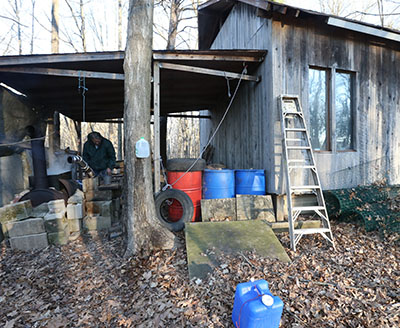
“In terms of new understanding, this study brings several important insights,” Saint Preux said. “It allows for a deeper understanding of the factors influencing the maple syrup industry in the area. It offers valuable insights into the implementation of sustainable forest management practices and their significance in sustainable maple syrup production. It also highlights the significance of green practices to safeguard natural resources, reduce environmental impacts, and optimize production efficiency. By providing these new insights, the study deepens our understanding of the interplay between sustainable practices, environmental considerations, and the growth of the maple syrup industry in Indiana.”
Saint Preux, who earned his bachelor’s in agricultural sciences at the State University of Haiti in 2019 and a master’s of sciences in rural sociology from Auburn University in 2022, said the maple syrup project allows him to apply his true passion in conducting research related to natural resource economics.
“The maple syrup project is particularly appealing to me for several reasons,” he explained. “Firstly, I am eager to establish connections with maple producers and gain a deeper understanding of their industry. Secondly, I see this project as an opportunity to contribute to the growth and productivity of the maple syrup industry, allowing them to reach a broader consumer base. By participating in the maple syrup project, I hope to combine my academic background and research skills to make a meaningful impact in the field of natural resources economics. I am excited to contribute to the advancement of this industry and help maple syrup producers thrive."
Paudel, who earned her bachelor’s in agriculture at the Agriculture and Forestry University in Rampur, Chitwan, Nepal in 2017, and master’s degrees in economics and data science at South Dakota University in 2021 and 2022 respectively, is applying her past experiences in food and consumer economics to the maple syrup project.
Her master’s work included projects on U.S. consumers’ acceptance and willingness to pay for genetically modified and genome-edited foods, and willingness to pay for pork produced with minimal and no-use of antibiotics.
“I am contributing to the research project based on my personal interest and expertise in the related field, even though it is not the major focus of my dissertation,” Paudel said. “What held my interest and drove my attention towards the research project related to maple syrup, is the realization that, food markets are affected by several factors such as production methods, product attributes, and heterogenous consumer preferences and concerns. This fascinated me to unravel the existing issues related to maple syrup production and consumption, with the aim of contributing towards the development of a sustainable maple syrup industry in Indiana.”
Paudel’s main research focus is to examine the effectiveness of cost-share programs on changing conservation behavior, a project funded through a National Institute of Food and Agriculture (NIFA) grant titled “A Retrospective Assessment of Conservation Cost Sharing’s Success in Controlling Invasive Plants in Non-Industrial Private Forests,” also directed by Dr. Zhou.




